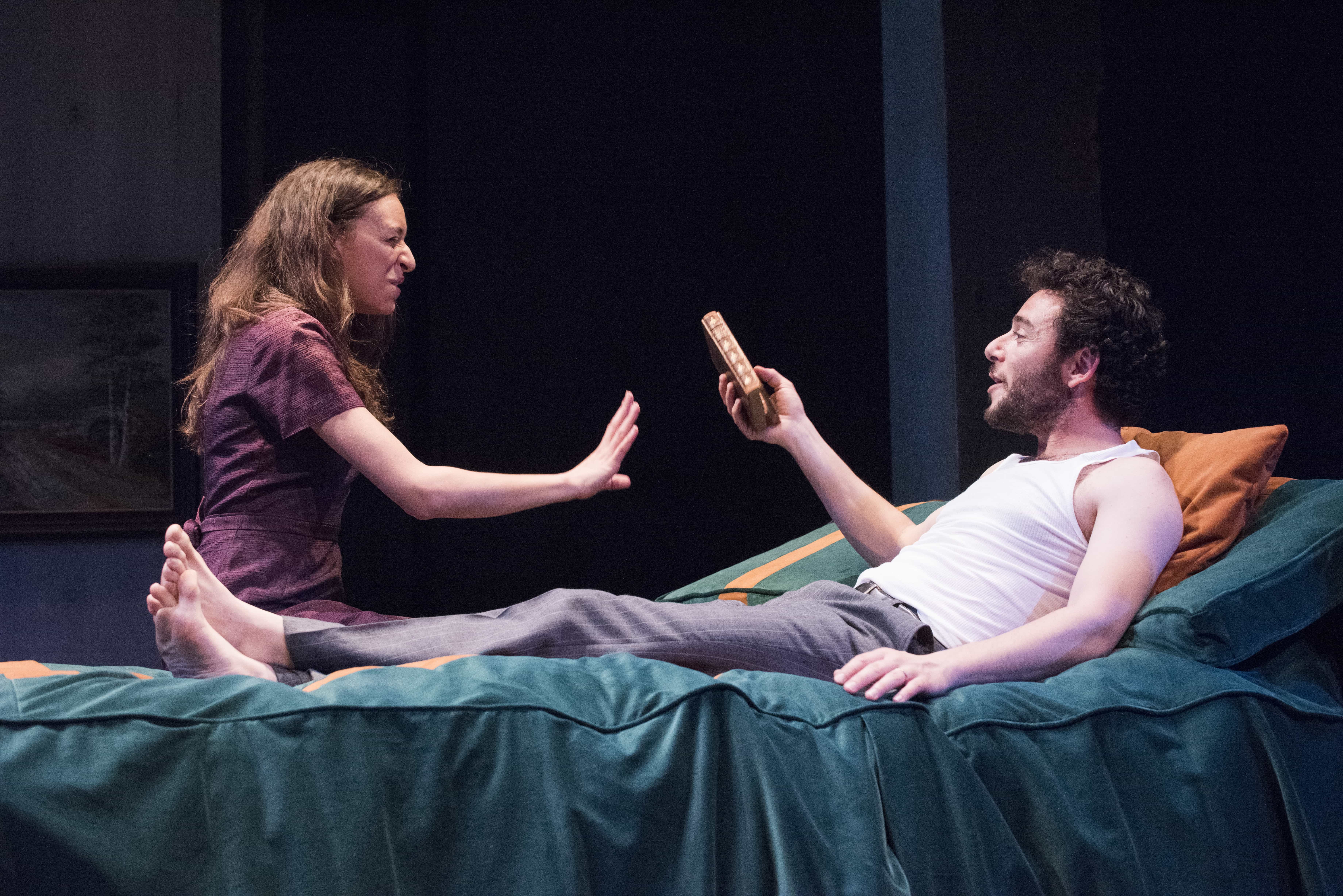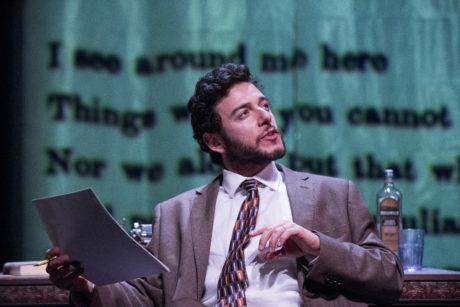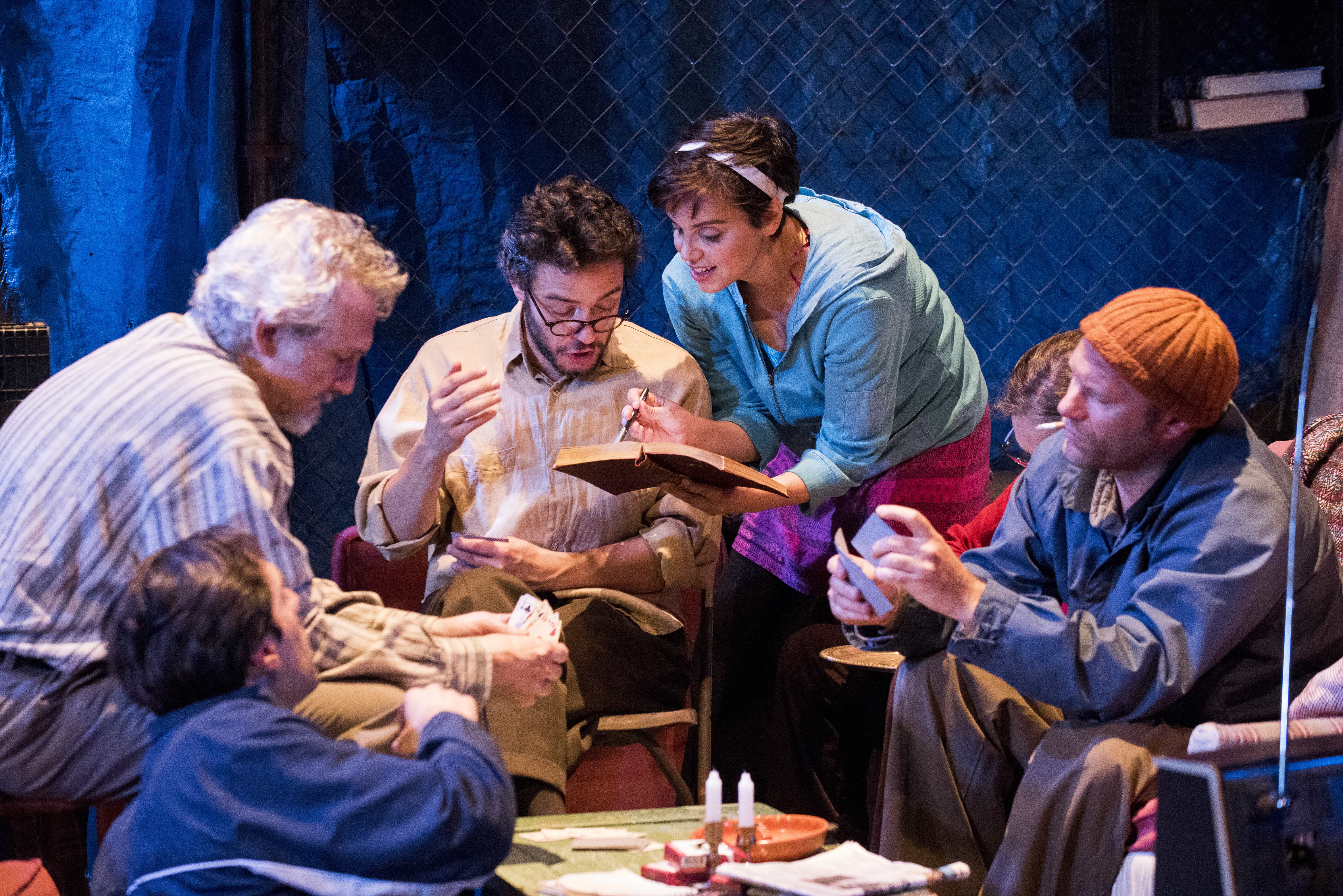The vagrant of the title is a Palestinian scholar named Adham who, while on a trip to London as a grad student, must decide, when war breaks out in his homeland, whether to stay or go. Will he remain in London as an emigrant academic, or will he return to Lebanon as a refugee? In neither alternative will he ever again feel at home.
In the first part, Playwright Mona Mansour sets up Adham’s quandary, gives him compelling reasons to choose both alternatives, and leaves us at intermission in suspense about his choice. In the second part, we find out what happens if he remains; in the third part, what happens if he returns. This ingenious if/then structure plays out over three enthralling hours of heartfelt storytelling, touchingly funny and achingly poignant.

Then there’s a part four. It plays out in the mind when the trilogy is over. Because afterward it dawns that the vagrant of the title has come to stand in for the millions of people in the world—refugees, asylum-seekers, others displaced by strife—for whom home is not an option. This astonishing synecdoche Mansour achieves with not a jot of rhetoric, and nary a note of moralizing (which may come as a surprise to anyone with preconceptions about how Mosiac might program a play about Palestinians). Instead, The Vagrant Trilogy is simply darn good drama: a thoroughly enjoyable and eye-filling production with vividly relatable characters. And the play does what all great theater does: it gives a human face to what we could not otherwise grasp.

Adham, whose specialty is English Romantic poetry, is invited to London to present a paper about Wordsworth at a scholarly meeting. He is accompanied by his wife of three weeks, Abir, an engineer. The acting throughout is superb and especially so in the onstage chemistry between Adham (a charmingly brainy Hadi Tabbal) and Abir (a spiritedly assertive Dina Soltan), which pulls us immediately into the story. We’re engaged by their interactions with fellow academics George (Elan Zafir) and Theo (Shpend Xani) and George’s girlfriend Diana (a livewire Nora Achrati). We recognize Adham’s anxiety as he preps for his presentation. We grow fond of the honeymooners in their hotel room. We are amused by his anxiety about whether he’s mediocre. It’s all more familiar than foreign as when personal and political tensions get the better of two and Abir tells Adham she’s going back to Lebanon. He should too, she says, for the sake of his ailing mother and troubled brother, but if he doesn’t she’s going to pack up and leave without him. And then boom, in an epic flare of lights and projections and a fusillade of combat sounds, the Six Day war begins. End of part one, with Adham on the horns of his dilemma.
The rest of the story (or stories, for there are two divergent ones) is best found out in person in performance. Mansour has a wonderful knack for revealing human interest details that enrich our sense that this could all be real life, without ever seeming sit-com-y. Tabbal continues as Adham, Soltan continues as Abir (and briefly as one of Adham’s students); and the other cast members, joined by Michael Kramer, appear variously as characters including Adham’s mother (Achrati), brother (Xana), son (Zafir), and daughter (Achrati). There’s a lot of literary commentary, not only Adham’s heady riffs on Wordsworth but also his brother’s funny take on the motivational bestseller Who Moved My Cheese? And scenes are consistently played with brio as when Adham at a clinic is hilariously misunderstood by Ashrati playing an intake nurse.

Director Mark Wing-Davey stages scene after scene as if cinematically, with set pieces moving in and out on Set Designer Luciana Stecconi’s stark context of broken concrete pillars, lit in sharp relief by Lighting Designer Reza Behjat, a panoply of imagery by Projections Designer lending each onstage moment dimension. Costume Designer Ivania Stack takes characters credibly from trendy London in 1967 and 1982 to a cramped room in a refugee camp. And Sound Designer David Lamont Wilson creates a soundscape of period popular music, warfare, and more so vividly expressive it ought to win an award.
The three parts of The Vagrant Trilogy have never been performed together before, and Mosaic has produced the whole as part of the 2018 Voices From a Changing Middle East Festival. Though the play touches on the routine derogation and intractable conflict endured by Palestinians, it requires no first-hand experience or expertise to follow and comprehend. Its characters, storylines, and emotions are so accessible, and it unfolds with such momentum, that it’s almost like watching a film. Which someday this remarkable dramatic material really ought to become.
Running Time: Three hours 30 minutes, including two intermissions.
The Vagrant Trilogy plays through July 1, 2018, at at the Atlas Performing Arts Center, Lang Theatre – 1333 H St NE, Washington, DC 20002. For tickets, call the box office at (202) 399-7993 ext 2 or purchase them online.




